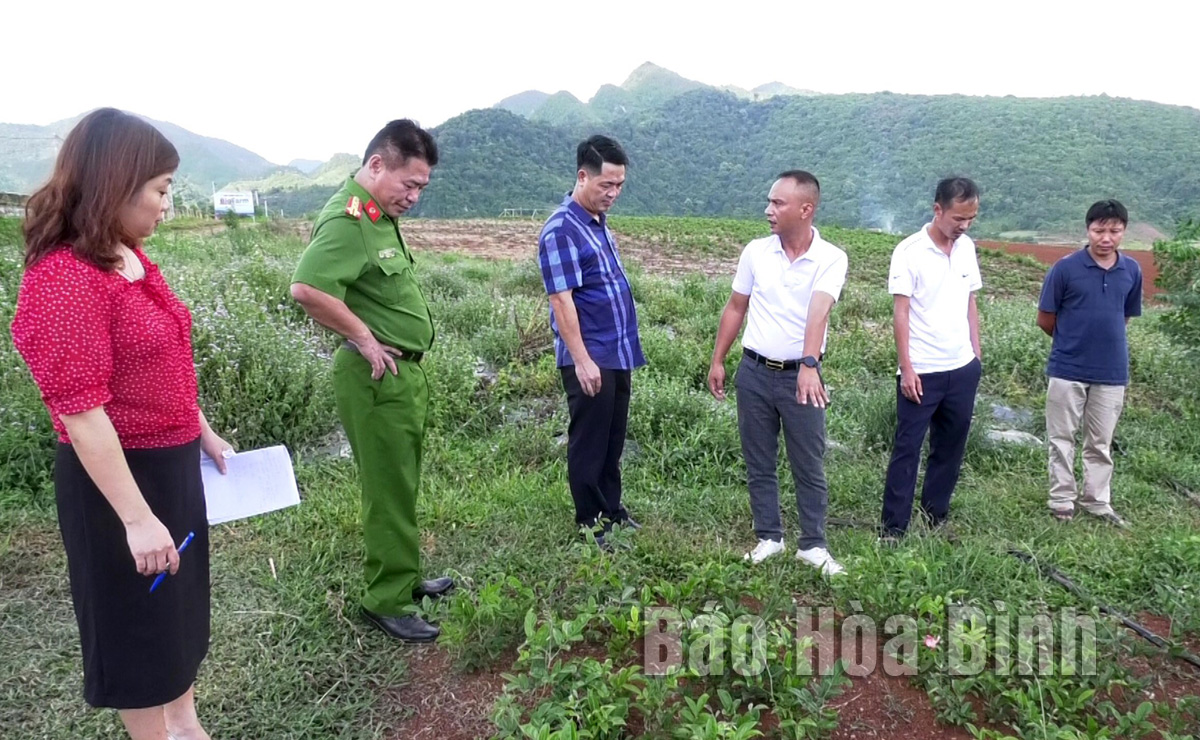
(HBO) - Besides the advantages of beautiful natural landscape, cool climate, rich and diverse cultural identity, friendly and hospitable people, Da Bac district also has over 6,000 hectares of water surface on the Da hydropower plant reservoir which is regarded as "another Ha Long Bay on land". Its geographical location near Hoa Binh city and Hanoi capital makes the district an attractive investment for socio-economic development.
Luong Van Thi (fourth from right), Chairman of Da Bac district People's
Committee inspects the effectiveness of the model of growing medicinal plants
in Yen Hoa commune.
Luong Van Thi, Chairman of the district People's Committee, said that Party
committees and authorities at all levels have focused on restructuring the
agro-forestry economy in line with the strengths of each commune and locality.
As a result, the socio-economic development of the district has gradually
achieved positive results. The production value has grown at a rate of
7.14%.
Over the past years, the district has fully optimised the Party, State and
Government’s programmes and policies to support socio-economic development in
communes relocated to make room for the reservoir. It focuses on mobilising
capital sources to develop sustainable livelihoods for local residents such as
forest plantation, cattle raising, developing fish cage farming in the
direction of commodity development, and training professional human resources
to serve the demand of local socio-economic development.
Hoa Binh province has also carried out many specific policies to support
socio-economic development, and improve the lives of relocated people such as
projects on crop restructuring, livestock breeding, cage fish farming and
developing eco-tourism, creating livelihoods for people.
Hundreds of households relocated for the reservoir of the Da River hydropower
plant have invested in cage fish farming with output reaching over 1,300 tonnes
per year and earning hundreds of billions of Vietnamese dong in revenue.
Dozens
of investors have come to the locality to survey and seize business
opportunities. There are 20 non-budget investment projects that have been
approved by the provincial People's Committee in the fields of afforestation,
production and tourism.
According to Chairman Thi, despite of positive results brought about by the
socio-economic development programmes, the district still faced difficulty in
stabilising life and long-term production for relocated people because most of
them are ethnic minorities with backward farming practices.
The
rate of poor households in the locality is still high due to unstable
production.
It is
hoped that more favourable policies should be devised for the relocated people,
especially in supporting the construction of essential infrastructure and
encouraging enterprises to invest in food processing and sales, he said./.
The Department of Education and Training of Hoa Binh province held a conference on March 18 to review the performance of the "Safe and Happy School" Project and set out tasks for 2025. The project, funded by the Taiwan Fund for Children and Families (TFCF), aims to create a safe, inclusive, and supportive learning environment for students. The event saw the attendance of representatives from the TFCF and 26 beneficiary schools.
With over 70% of their workers being women, trade unions across industrial parks (IPs) in Hoa Binh have been actively safeguarding their legal rights and interests while implementing initiatives to improve their income and well-being.
In recent years, the Hoa Binh provincial General Hospital has continuously innovated itself and improved the quality of medical services to meet the increasing needs of local people. With substantial investments in infrastructure and modern equipment, along with a team of highly qualified doctors and nurses, the hospital has gradually established itself as one of the leading medical units in the Northwestern region and a trusted destination for healthcare for people inside and outside the province.
From mastering the fundamentals of programming to achieving national recognition, the Programming Club of the Le Van Tam Primary School (STAR LVT28) in Hoa Binh city has made remarkable strides in the field of robotics.
The Ho Chi Minh Communist Youth Union Committee and the Vietnam Youth Federation chapter of Hoa Binh province organised a programme on March 12 to launch the "Digital Literacy" movement and an online quiz on the resolutions of the Vietnam Youth Federation congresses at all levels, as well as the Politburo's Resolution No. 57-NQ/TW on breakthroughs in the development of science, technology, innovation, and national digital transformation.
As climate change grows more unpredictable, the development of production forests has become essential - not just for economic growth, but for safeguarding the environment and maintaining ecosystem balance. By boosting local incomes, curbing natural disasters, preventing soil erosion, and protecting water resources, these forests play a crucial role in sustainable development.



